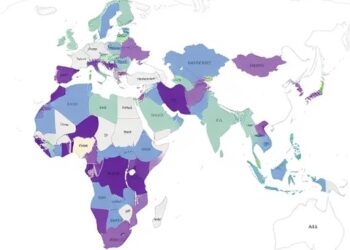BOSTON—Widespread availability of telemedicine during the pandemic led to more equitable access to endocrinology care for patients with type 2 diabetes and heart disease, according to a study being presented Monday at ENDO 2024, the Endocrine Society’s annual meeting in Boston, Mass.
Patients who benefited included those living in rural areas and in neighborhoods with lower socioeconomic status, according to the study.
While most adults with type 2 diabetes receive care in the primary care setting, adults who have both type 2 diabetes and cardiovascular disease are at high risk for diabetes-related complications and may benefit from receiving specialty care for diabetes by an endocrinologist. However, access to this care is limited by both a shortage of endocrinologists as well as patient-level barriers including lack of transportation, mobility challenges, and long travel times to the nearest endocrinology clinic, according to study co-author Margaret Zupa, M.D., of the University of Pittsburgh School of Medicine in Pittsburgh, Pa.
“Telemedicine can help patients overcome many of these barriers and can enhance access to endocrinology care for these patients,” she said.
The researchers analyzed electronic medical records for 9,546 adults who had type 2 diabetes and cardiovascular disease and were seen between January 2018 and June 2022 in a single large integrated health system. The study compared two periods: pre-telemedicine (January 1, 2018 to March 15, 2020) and post-telemedicine (March 16, 2020 to June 30, 2022).
In total, 1,725 patients received endocrinology care during the study period. The study found that before telemedicine, patients more likely to receive endocrinology care were those who lived a shorter distance to endocrinology clinic, in more walkable neighborhoods with higher neighborhood socioeconomic status, and those who were younger, non-white, with more co-occurring health conditions.
“After widespread use of telemedicine, travel distance to endocrinology clinic, race, and neighborhood socioeconomic status had less impact on endocrinology care access compared to the pre-telemedicine period, while younger age had a stronger relationship with receipt of this care,” Zupa said. “The findings suggest telemedicine can help make access to endocrinology care more equitable for patients who face barriers to in-person care, such as those living in rural areas or neighborhoods with low socioeconomic status.”
# # #
Endocrinologists are at the core of solving the most pressing health problems of our time, from diabetes and obesity to infertility, bone health, and hormone-related cancers. The Endocrine Society is the world’s oldest and largest organization of scientists devoted to hormone research and physicians who care for people with hormone-related conditions.
The Society has more than 18,000 members, including scientists, physicians, educators, nurses and students in 122 countries. To learn more about the Society and the field of endocrinology, visit our site at www.endocrine.org. Follow us on Twitter at @TheEndoSociety and @EndoMedia.
BOSTON—Widespread availability of telemedicine during the pandemic led to more equitable access to endocrinology care for patients with type 2 diabetes and heart disease, according to a study being presented Monday at ENDO 2024, the Endocrine Society’s annual meeting in Boston, Mass.
Patients who benefited included those living in rural areas and in neighborhoods with lower socioeconomic status, according to the study.
While most adults with type 2 diabetes receive care in the primary care setting, adults who have both type 2 diabetes and cardiovascular disease are at high risk for diabetes-related complications and may benefit from receiving specialty care for diabetes by an endocrinologist. However, access to this care is limited by both a shortage of endocrinologists as well as patient-level barriers including lack of transportation, mobility challenges, and long travel times to the nearest endocrinology clinic, according to study co-author Margaret Zupa, M.D., of the University of Pittsburgh School of Medicine in Pittsburgh, Pa.
“Telemedicine can help patients overcome many of these barriers and can enhance access to endocrinology care for these patients,” she said.
The researchers analyzed electronic medical records for 9,546 adults who had type 2 diabetes and cardiovascular disease and were seen between January 2018 and June 2022 in a single large integrated health system. The study compared two periods: pre-telemedicine (January 1, 2018 to March 15, 2020) and post-telemedicine (March 16, 2020 to June 30, 2022).
In total, 1,725 patients received endocrinology care during the study period. The study found that before telemedicine, patients more likely to receive endocrinology care were those who lived a shorter distance to endocrinology clinic, in more walkable neighborhoods with higher neighborhood socioeconomic status, and those who were younger, non-white, with more co-occurring health conditions.
“After widespread use of telemedicine, travel distance to endocrinology clinic, race, and neighborhood socioeconomic status had less impact on endocrinology care access compared to the pre-telemedicine period, while younger age had a stronger relationship with receipt of this care,” Zupa said. “The findings suggest telemedicine can help make access to endocrinology care more equitable for patients who face barriers to in-person care, such as those living in rural areas or neighborhoods with low socioeconomic status.”
# # #
Endocrinologists are at the core of solving the most pressing health problems of our time, from diabetes and obesity to infertility, bone health, and hormone-related cancers. The Endocrine Society is the world’s oldest and largest organization of scientists devoted to hormone research and physicians who care for people with hormone-related conditions.
The Society has more than 18,000 members, including scientists, physicians, educators, nurses and students in 122 countries. To learn more about the Society and the field of endocrinology, visit our site at www.endocrine.org. Follow us on Twitter at @TheEndoSociety and @EndoMedia.




